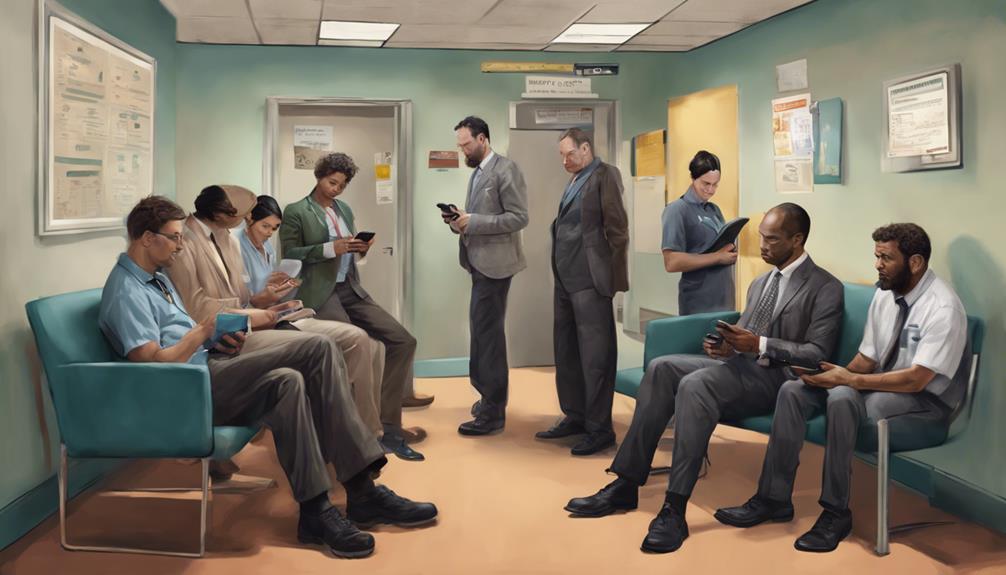Hospitals conduct thorough background checks for all employees to uphold safety standards. These checks include criminal history screenings to flag any concerning offenses like violence or drugs. Mandatory drug screenings help maintain a safe workplace and prevent substance abuse. Educational and professional qualifications are verified to guarantee transparency and credibility. Additional measures such as national sex offender searches and identity verification further enhance safety protocols. These exhaustive checks aim to create a secure environment for patients and staff.
Key Takeaways
- Hospitals conduct criminal background checks for violent felonies, sex offenses, drug offenses, and financial crimes.
- Mandatory drug screenings ensure a drug-free workplace and address substance abuse promptly.
- Education and professional verification confirm qualifications, certifications, and license validity for credibility.
- Additional measures include national sex offender searches, identity verification, and federal exclusion searches.
- The aim is to maintain a safe environment, prevent harmful behavior, and ensure regulatory compliance.
Criminal Background Checks
Hospitals prioritize conducting criminal background checks on potential employees to guarantee a safe and secure environment for patients and staff. These checks aim to uncover any concerning criminal records that may pose a risk to patient safety or compromise the integrity of the healthcare setting.
By identifying red flags such as violent felonies, sex offenses, drug offenses, or financial crimes, hospitals can make informed decisions when hiring new staff members. The goal of these criminal background checks is to make sure that individuals with a history of harmful behavior or illegal activities aren't placed in positions where they could potentially harm patients or violate their trust.
Drug Screening Process

Hospitals mandate drug screening to uphold safety standards and prevent substance abuse risks among staff. The process involves specific requirements, detailed testing procedures, and a clear policy on handling positive results.
Drug Screening Requirements
Drug screening is a vital step in the background check process for healthcare employees in hospitals. Hospitals conduct drug screening to confirm compliance with safety protocols, prevent theft, abuse, and drug-related risks, ensuring a safe work environment and promoting sound decision-making among staff. This process is fundamental in verifying that healthcare employees are capable of handling medications responsibly. By incorporating drug screening into their standard due diligence procedures, hospitals enhance security and trust in their hiring process.
To provide a clearer picture, here is a breakdown of drug screening requirements in hospital background checks:
| Drug Screening Requirements | Details | Importance |
|---|---|---|
| Mandatory for all employees | Confirms compliance with safety protocols | Promotes a drug-free workplace |
| Random screenings | Prevents substance abuse among staff | Maintains a safe environment |
| Post-incident screenings | Identifies potential issues promptly | Addresses risks effectively |
Testing Procedures Overview
Conducting drug screening as part of the background check process for healthcare workers guarantees the safety and integrity of hospital operations. Drug screening is an essential step in preventing theft, abuse, and drug-related risks within healthcare settings. This standard procedure guarantees a safe work environment for both staff and patients.
When hospitals implement drug testing as part of their due diligence in hiring healthcare professionals, they uphold an important component of maintaining patient safety and quality care. The process typically involves collecting samples, such as urine or hair, to detect the presence of drugs in an individual's system. These screenings help identify healthcare workers who may pose a risk due to substance abuse.
Policy on Positive Results
Positive drug screening results prompt hospitals to implement policies that focus on addressing employee wellness and maintaining a safe work environment. When an employee tests positive during healthcare background checks, hospitals typically have specific protocols in place to handle such situations. These policies may involve further evaluation to determine the extent of the issue and potential disciplinary action as necessary.
By prioritizing patient safety and employee well-being, hospitals aim to uphold a drug-free workplace environment in healthcare settings. Additionally, in line with these policies on positive drug screening results, hospitals may offer support or resources to employees who test positive. This assistance can include access to counseling services, substance abuse treatment programs, or other forms of help to address any underlying substance abuse issues.
Ultimately, these policies are essential for ensuring a secure and healthy work environment within hospitals, benefiting both employees and the patients they care for.
Education Verification Requirements

Education verification requirements are essential for hospitals to verify that healthcare professionals' academic qualifications align with their roles. When conducting background checks on potential staff, hospitals typically follow these steps for education verification:
- Confirm Degrees and Certifications: Hospitals verify the degrees and certifications listed on a healthcare professional's resume to guarantee accuracy and legitimacy.
- Validate Attendance Dates: Education verification checks involve confirming the dates of attendance at educational institutions to verify the completion of required degrees within the specified timeline.
- Check for Special Honors: Hospitals also validate any special honors or distinctions mentioned by healthcare professionals to uphold transparency and honesty in their academic background.
Professional Verification Checks

Professional verification checks are crucial for confirming the credibility and qualifications of healthcare workers. They provide employers with essential insights into a candidate's background by confirming details such as work history, job titles, and eligibility for rehire. By validating employment information and evaluating the legitimacy of job titles, these checks help healthcare facilities maintain high standards of professionalism and expertise among their staff.
These verification processes are integral to ensuring that healthcare workers possess the necessary qualifications and experience to deliver quality care to patients. By verifying their credentials, employers can trust that their staff members are competent and trustworthy professionals.
License Verification Process
To safeguard the integrity of their workforce, hospitals rigorously conduct license verification checks for healthcare workers. This process guarantees that medical staff possess valid state medical licenses and the necessary qualifications for their roles.
Additionally, professional verification includes confirming work history, job titles, employment details, and reasons for leaving previous positions.
Here are key aspects of the license verification process:
- Confirming Validity: Hospitals check the validity of healthcare workers' state medical licenses to uphold compliance with regulations.
- Professional Verification: This step involves validating work history, job titles, and reasons for leaving previous positions to validate the credibility of the healthcare worker.
- Screening for Sanctions and Exclusions: Hospitals also screen for any sanctions or exclusions in healthcare to prevent hiring individuals barred from federal healthcare programs.
Credentialing Requirements Overview
Hospitals implement thorough credentialing requirements to guarantee the competency and reliability of their healthcare workforce. These requirements encompass a range of background checks for healthcare workers to maintain a safe and high-quality care environment. Professional verification checks play an essential role in this process by confirming work history, job titles, reasons for leaving, and eligibility for rehire.
Additionally, they assess the validity of academic credentials, verify educational institutions, and confirm dates of attendance. Screening checks also help exclude individuals with sanctions from federal healthcare programs due to abuse, fraud, or substance abuse issues. Furthermore, background checks ensure a drug-free workplace, preventing impairment and reducing malpractice risks.
Common components of credentialing requirements in hospitals include criminal background checks, education verification, and license validations. By adhering to these stringent measures, hospitals prioritize patient safety and the delivery of excellent care.
Employment History Validation
Employment history validation is a key component of ensuring the competency and reliability of healthcare staff in hospital settings. Professional verification checks play an essential role in confirming work history, job titles, and employment details of healthcare staff.
Here are some essential aspects:
- Reasons for Leaving: These checks assess the reasons why individuals left their previous positions, providing insight into their professional conduct and performance.
- Eligibility for Rehire: Determining if a candidate is eligible for rehire at their previous places of work helps hospitals understand their past work behavior and performance.
- Qualifications Validation: Hospitals use professional verification to validate the qualifications and experience of potential employees, ensuring they meet the necessary standards for providing quality care.
Sanctions and Exclusions Screening

Regularly administered by the Office of the Inspector General, sanctions and exclusions screening in healthcare background checks guarantees compliance with federal regulations.
This screening process is essential for ensuring patient safety within healthcare facilities. It involves checking for individuals who've been excluded from federal healthcare programs due to various offenses like abuse, fraud, or substance abuse.
Hiring individuals with sanctions can lead to legal and ethical issues, ultimately jeopardizing the well-being of patients in hospitals.
National Sex Offender Search

In ensuring a secure environment for both patients and staff, national sex offender searches are an essential component of healthcare background checks. Hospitals conduct these searches to uphold safety standards and mitigate potential risks.
Here are some key points regarding national sex offender searches in healthcare background checks:
- Verification Process:
- Hospitals use national databases and state registries to screen for registered sex offenders.
- This process helps guarantee that individuals with a history of sexual offenses aren't employed in sensitive roles within healthcare settings.
- Patient and Staff Safety:
- By conducting these searches, hospitals prioritize the safety and well-being of both patients and staff.
- Screening for sex offender records plays an important role in creating a secure environment within healthcare facilities.
- Preventive Measures:
- National sex offender searches are a proactive measure to prevent potential threats and safeguard the integrity of healthcare institutions.
- Including these searches in background checks is essential for maintaining a safe and trusted healthcare environment.
Identity Verification Process

Hospitals prioritize verifying the identity of potential employees as an essential step in their background check process to guarantee the authenticity of applicants. This identity verification process involves confirming the details provided by applicants using official documents like driver's licenses or passports.
By ensuring that the person being hired is indeed who they claim to be, hospitals aim to prevent identity fraud and maintain the integrity of their hiring procedures. Confirming the identity of potential employees is vital in establishing a trustworthy workforce and safeguarding sensitive patient information.
This step serves as an initial checkpoint in the hospital's background screening process, setting the foundation for a thorough examination of an individual's qualifications and background. By diligently verifying the identities of applicants, hospitals can create a secure environment for both employees and patients, upholding the standards of professionalism and safety within their facilities.
Federal Exclusion Search

Conducting federal exclusion searches is an essential step in guaranteeing the integrity of healthcare workforce background checks. Hospitals rely on these searches to prevent hiring individuals who've been excluded from federal healthcare programs.
By consulting lists like the GSA Excluded Parties List, hospitals ensure regulatory compliance and industry standards are met. The purpose of these searches is to avoid potential legal issues and safeguard the hospital's reputation from unintentionally hiring sanctioned individuals.
Checking for federal exclusions not only protects the hospital but also maintains a safe and ethical work environment for both patients and staff. This screening measure is vital for upholding regulatory compliance standards and ensuring the overall integrity of the healthcare workforce.
Additional Considerations

When evaluating potential healthcare employees, it's essential for organizations to take into account various additional factors beyond standard background checks.
In addition to the typical employment screening procedures, hospitals often investigate professional references to gain valuable insights into a candidate's past work performance and behavior. This step helps guarantee that the individual is well-suited for the demands of the healthcare environment.
Additionally, civil court records may be examined to uncover any malpractice or misconduct lawsuits that could raise concerns about a candidate's suitability for employment. Hospitals also consider conducting credit history checks for certain roles, such as financial positions, to assess financial responsibility.
Drug screening is another vital component of healthcare background checks, aimed at maintaining a drug-free workplace and ensuring patient safety. By incorporating these additional considerations into their hiring processes, hospitals aim to create a safe and effective healthcare team.
Frequently Asked Questions
What Is Usually Checked in a Background Check?
In typical background checks, hospitals verify criminal history, education, employment, and professional licenses. They conduct drug screenings and may check industry exclusion lists and sex offender registries. These measures uphold safety and compliance standards.
What Is the Best Background Check for Healthcare Companies?
For healthcare companies, the best background checks often include national criminal searches, sex offender registry checks, and identity verification. These screenings prioritize safety and compliance, ensuring that candidates meet the necessary qualifications for roles within the organization.
What Level of Background Check Is Required in Nebraska?
In Nebraska, hospitals typically mandate Level 2 background checks for healthcare staff. These checks encompass national criminal searches, sex offender registry checks, and professional license verifications to guarantee patient safety and compliance with regulations.
Will a HIPAA Violation Show up on a Background Check?
Surprisingly, a HIPAA violation may not surface on a standard background check. Hospitals conduct thorough screenings to uphold HIPAA rules. However, past violations could emerge during references or employment history verification. Interviewers may inquire about this issue.
What specific background checks do hospitals conduct when hiring employees?
When hiring employees, hospitals conduct thorough background checks to ensure patient safety. This includes verifying education and licensing, checking for criminal records, and confirming employment history. By following these tips for background checks success, hospitals can maintain a high standard of care and trust in their workforce.
Conclusion
To sum up, hospitals conduct a variety of background checks to guarantee the safety and well-being of their patients.
Just as a gardener carefully tends to their garden, hospitals meticulously examine the backgrounds of their staff to cultivate a healthy and secure environment.
By thoroughly vetting potential employees, hospitals can maintain a high standard of care and trust within their facilities.









